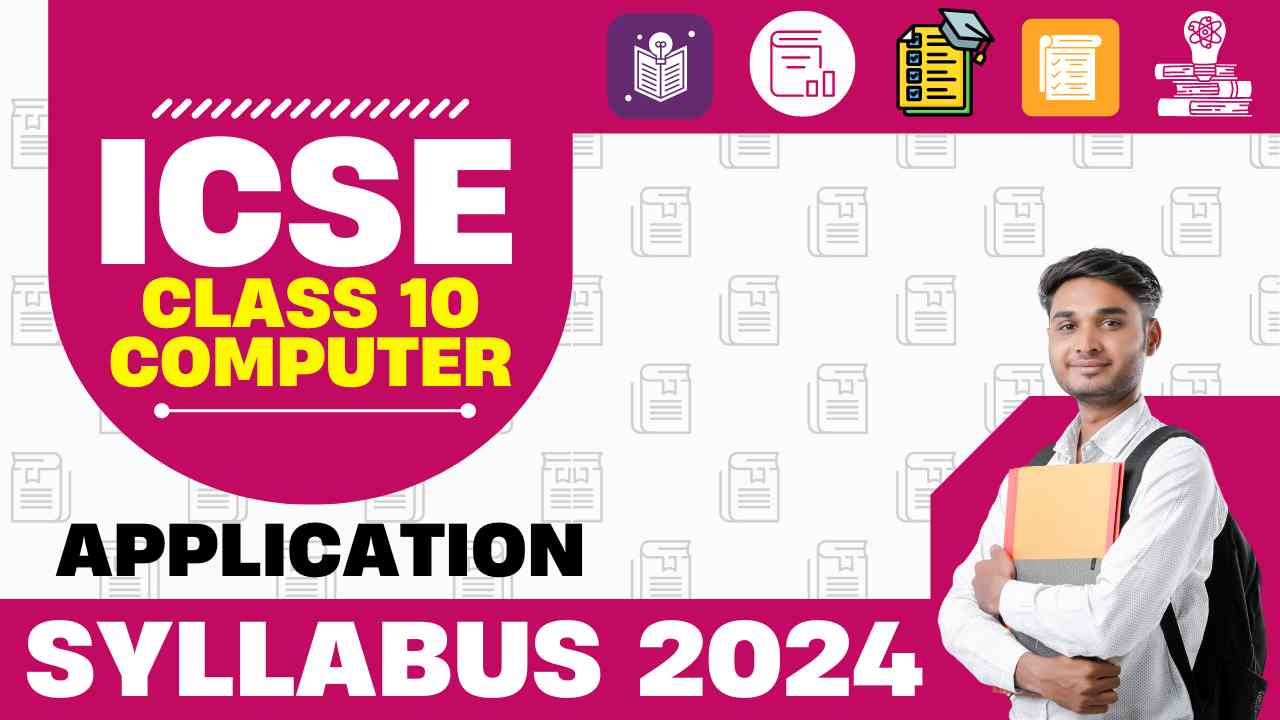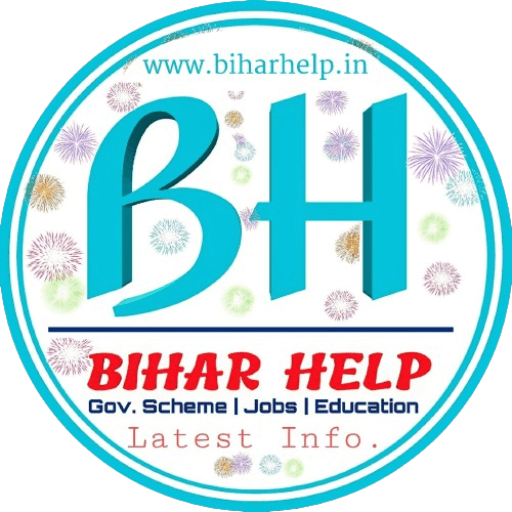ICSE Class 10 Computer Application Syllabus 2024: To succeed, you must study computer applications, a subject that involves many logical and practical components. Students will need right instruction and direction to get prepared for this subject.

For now, our website provides you with instructions for the ICSE Computer Application Syllabus 2024. ICSE Computer Applications syllabus for Class 10 helps students make a plan to address the subject effectively and efficiently by providing an overview of the curriculum structure.

ICSE Board Result 2023
ICSE Computer Applications Syllabus 2024 Overview
The following are important details about this ICSE Computer Application Syllabus.
| Aspects |
Details |
| Education Board |
CISCE Board |
| Classes |
ICSE (Class 10, 9) |
| Subject |
Computer Applications |
| ICSE Full Form |
Indian Secondary Education Certificate |
| Official Website for ICSE Class 10 Computer Application Syllabus |
cisce.org |
ICSE Class 10 Computer Application Syllabus
Given below is the ICSE Class 10 Computer Application syllabus 2024. Students are advised to check the table given below carefully as it will help them understand the syllabus better.
|
ICSE Class 10 Computer Application Syllabus 2024
|
| Term 1 (Marks: 40) |
Term 2 (Marks: 40) |
| Unit No. |
Name of the Unit |
Unit No. |
Name of the Unit |
| 1. |
Revision of Class IX Syllabus (Complete Unit) |
5. |
Library Classes (Complete Unit) |
| 2. |
Class as the Basis of all Computation (Complete Unit) |
6. |
Encapsulation (Complete Unit) |
| 3. |
User-defined Methods (Complete Unit) |
7. |
Arrays (Complete Unit) |
| 4. |
Constructors (Complete Unit) |
8. |
String Handling (Complete Unit) |
ICSE Board Result 2023
Important Topics of ICSE Class 10 Computer Application Syllabus
There are 8 units in ICSE Class 10 Computer Application Syllabus topic. The first unit is a review of the topics learned in Class 9. The major topics to be covered for ICSE Class 10 Exam 2024 of Computer Applications include Objects, Classes, User-Defined Methods, Library Classes, Encapsulation, Constructors, Arrays and String Handling. The unit-wise topics covered in the Principles section of ICSE Class 10 Computer Application Syllabus are as follows:
Unit 1: Revision of Class IX Syllabus
Given below are the important topics discussed in this unit:
- Introduction to Object-Oriented Programming Concepts
- Elementary Concept of Objects and Classes
- Values and Data Types
- Operators in Java
- Input in Java
- Mathematical Library Methods
- Conditional constructs in Java
- Iterative constructs in Java.
Unit II: Class on the Basis of All Computation
Given below are the important topics discussed in this unit:
- Objects and Classes
- Objects encapsulate state and behavior – numerous examples; Member Variables; Properties or characteristics. The variables define the state; and member methods;
- Operations/methods/messages/ methods define behaviour.
- Classes as an abstraction for sets of objects; Class as an object factory; Primitive Data Types, and Composite Data Types. Variable announcements for both types; Difference between both types. Objects as examples of a class. Let us consider real life examples to explain the concept of class and object.
Unit III: User-Defined Methods
Given below are the important topics discussed in this unit:
- Need of Methods, Syntax of Methods, Forms of Methods, Method Definition, Method Calling, Method Overloading, Declaration of Methods
- Ways to define a method, Ways to invoke methods – Call by value [with program] and Call by reference [Definition with example only]
- Object creation – implementing methods with respect to the use of multiple methods with different names to implement modular programming using data members and member methods
- Actual parameters and formal parameters, Declaration of methods – static and non-static, Method prototypes/signatures
- Pure and impure methods, – pass by value [with programs] and pass by reference [definition only with example]
- Returning values from methods, multiple methods with the same name and using more than one method (polymorphism – method overloading).
Unit IV: Constructors
The following topics are included under Unit IV:
- Definition of Constructor, Types of Constructor, Features, Uses of Constructor, Constructor Overloading.
- Default Constructor, Constructor Overloading, Parameterized Constructor, Difference between Constructor and Method.
Unit V: Library Classes
Given below are the important topics discussed in this unit:
- Introduction to wrapper classes, wrapper class methods and their use with numeric and character data types.
- Autoboxing and unboxes in wrapper classes.
- Class as a composite type, the difference between primitive data types and composite data types or class types. Class can be considered as a new data type created by the user, which has its own functionality.
- The distinction between the primitive and composite types should be discussed through examples. Show how classes allow user-defined types to exist in programs.
- All primitive types have matching class wrappers.
- Introducing autoboxing and unboxing with their definition and simple examples.
- The following methods are to be covered:
- int parseInt(String s)
- long parseLong(String s)
- float parseFloat(String s)
- double parseDouble(String s)
- boolean isDigit(char ch)
- boolean isLetter(char ch)
- boolean isLetterOrDigit(char ch)
- boolean isLowerCase(char ch)
- boolean isUpperCase(char ch)
- boolean isWhitespace(char ch)
- char toLowerCase (char ch)
- char toUpperCase(char ch)
Unit VI: Encapsulation
Given below are the important topics discussed in this unit:
- Access modifiers and their scope and visibility.
- Access modifiers – private, protected and public.
- Visibility rules for private, protected and public access modifiers.
- Scope of variables, instance variables, class variables, argument variables, local variables.
Unit VII: Arrays
This unit involves the following topics:
- Definition of an array, types of array, declaration, initialization and accepting data of a single dimensional array, access to the elements of a single dimensional array.
- Arrays and their uses
- Search techniques – linear and binary search
- Array as a composite type, length specification to know the size of the array (finding technique using only single dimensional array).
Unit VIII: String Handling
Given below are the important topics discussed in this unit:
- String class
- Methods of String class
- Implementation of String class methods
- String array
- The following String class methods are to be covered:
- String trim ()
- String toLowerCase()
- String toUpperCase()
- int length( )
- char charAt (int n)
- int indexOf(char ch)
- int lastIndexOf(char ch)
- String concat(String str)
- boolean equals (String str)
- boolean equalsIgnoreCase(String str)
- int compareTo(String str)
- int compareToIgnoreCase(String str)
- String replace (char oldChar,char newChar)
- String substring (int beginIndex)\
- String substring (int beginIndex, int endIndex)
- boolean startsWith(String str)
- boolean endsWith(String str)
- String valueOf(all types)
ICSE Class 10 Computer Application Internal Assessment
The ICSE Class 10 Computer Application internal assessment for Computer Applications is practical-oriented, emphasizing fast and efficient acquisition of basic programming skills. Students are required to complete a minimum of 20 laboratory tasks throughout the year to reinforce the concepts learned in theory class.
- Lab assignments should involve problems that require design, implementation, and testing.
- They should also cover the concepts discussed in the theory class.
- The teacher-in-charge will maintain a record of all completed assignments, which will be considered during the cumulative assessment at the end of the year.
Sample problems for ICSE Class 10 Computer Application Assignment include:
1. User-Defined Methods:
- Programs showing pure, pure, static and non-static methods.
- Program based on method overloading.
- Programs that involve data members and member methods with object instantiation.
2. Constructors:
- Programs based on different types of constructors mentioned in the course.
- Programs and output displaying constructor overloading.
3. Library Classes:
- Outputs based on methods mentioned in the course.
- Program to check the characteristics of characters like uppercase, lowercase, digits etc.
4. Encapsulation:
- Questions based on identification of different variables like local, instance, argument, private, public, class variables etc.
5. Arrays:
- A program based on accessing the elements of an array.
- Programs based on the sort and search techniques outlined in the course.
6. String Handling:
- Output based on all the string methods mentioned in the course.
- A program based on removing and manipulating characters in a string.
- Functions such as checking palindrome strings, Pig Latin conversion, alphabetical ordering of characters, etc.
ICSE Computer Application Syllabus Aims
- Empowering students by enabling them to create their own apps.
- To introduce some effective tools to enable students to enhance their knowledge, broaden horizons, boost creativity, improve quality of work and enhance efficiency.
- To develop logical & analytical thinking that can they easily solve interactive programs.
- To help students learn the fundamental concepts of computing in a computer language using an object-oriented approach.
- To provide students with a clear awareness of the ethical issues involved in the field of computing.
ICSE Class 10 Computer Application Syllabus Key Pointers
- There will be a written paper of two hours duration carrying 100 marks and internal assessment carrying 100 marks.
- The paper will be divided into two parts A and B.
- Section A (Compulsory – 40 marks) will consist of mandatory short answer questions covering the entire syllabus.
- Section B (60 marks) will contain questions that require detailed answers. In this section there will be a choice of questions.
FAQs (ICSE Class 10 Computer Application Syllabus 2024)
How many marks are in the course?
This course is of 80 points. The unit on Networking is 15 marks, the unit on HTML is 25 marks, the unit on Cyber Ethics is 10 marks, and the unit on Practical is 50 marks.
Where can I find courses?
The curriculum can be found on CBSE website (www.cbse.nic.in). The syllabus is also available in PDF format on many other websites.
How is the ICSE Class 10 Computer Applications syllabus assessed?
ICSE Class 10 Computer Applications course is assessed through two components: a two-hour written paper of 100 marks and internal assessment of 100 marks.
How many lab assignments are required for internal assessment of ICSE Class 10 Computer Applications subject?
All Students have to complete a minimum of 20 laboratory assignments during the entire academic year that can they reinforce the concepts learned in the theory class. These assignments should include designing, implementing, and testing programs that incorporate the concepts discussed in theory class.
BiharHelp App
आपके उज्जवल भविष्य के लिए महत्वपूर्ण जानकारी यहाँ उपलब्ध है - सरकारी नौकरियाँ, परीक्षा परिणाम, प्रवेश पत्र और शैक्षिक अवसर। नवीनतम अपडेट और आवश्यक सूचनाओं के लिए BiharHelp ऐप डाउनलोड करें - आपकी सफलता का साथी।
Related Posts
- Bihar Home Guard Havildar Clerk Syllabus 2026: Exam Pattern, Subject-Wise Syllabus & PET Details
- SSC MTS Syllabus 2026: CBT Exam Pattern, Physical Test Details, Subject-Wise Syllabus & PDF Download
- UP Police Constable Syllabus 2026 – Exam Pattern, Subject-Wise Topics and New Preparation Guide
- UP Lekhpal New Syllabus 2026: Exam Pattern, Selection Process & PDF Download
- SSC GD Syllabus 2026: Exam Pattern, Selection Process, CBT Syllabus, PET/PST Details & PDF Download
- Bihar BEd Syllabus 2026: Exam Pattern, Subject-Wise Topics, Selection Process & PDF Download
- RRB Group D Syllabus 2026 PDF Download – Exam Pattern & Subject Wise Details
- UP Police Computer Operator Syllabus 2026: Exam Pattern, Selection Process, Subject-Wise Detailed Syllabus & PDF Download
- BTSC Pump Operator Syllabus 2025: Exam Pattern, Selection Process & PDF Download
- DSSSB MTS Syllabus 2026: Exam Pattern, Selection Process & Subject-wise Topics PDF
Jobs & शिक्षा से जुड़ी सभी जानकारी ! (यहाँ Click करें 👆)



